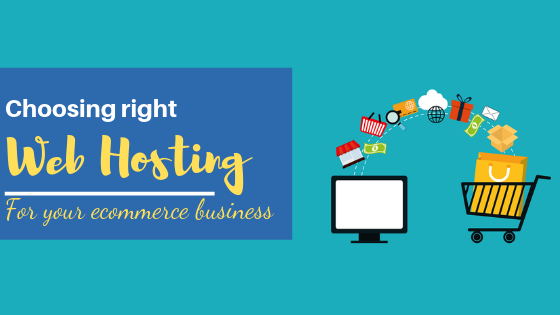Tag: Ecommerce Website

6 Things To know Before Choosing Web Hosting For Your Website
No matter how awesome your products are, a powerful web hosting solution is the most for your ecommerce store. Surprisingly, this is not a decision that you can rush into. Ensuring that your ecommerce store is offering a hassle-free experience is necessary. While a solid web hosting can work as a fuel to ignite the growth, a bad one can make your customers leave and never come back. Your customers want an experience, and being an entrepreneur, you need to ensure that it is a good one. The type of web hosting you choose will affect your website speed, uptime and ultimately the overall performance. Only the right web hosting has the capabilities to ensure a smooth customer experience. In this article, I am going to share some of the things you must consider while choosing the right hosting for your ecommerce store. 6 Things To Consider Before Choosing Web Hosting For Your Ecommerce Website: 1. Analyze ecommerce software capabilities: Shopping cart functionality is one of the most crucial parts of every ecommerce store out there. You need to provide your visitors the quickest way to add products in the cart and check out whenever they want. Additionally, your website must handle customer’s payment details very safely. These are some of the common standards that must be followed by every com software. While some web hosting solutions already have these features included, some others expect you to buy separate software products for the same. No matter which one you go for, you must ensure that your web hosting plan provides the compatibility to add these features. Lastly, the less the hurdles, the better is hosting. 2. Security is your customer’s priority, make it yours too: When you are dealing in an ecommerce niche, customer data security should be your topmost priority. One err... And your customers won’t feel for you. At every stage of the customer journey, their sensitive information like bank details, credit card details, etc. must be encrypted. The best way to ensure this is to implement an SSL certificate in your store. Most of the time bundled SSL certificate is already provided with a web hosting package. Although, many reliable web hosting solutions provide SSL certificates without charging anything extra. You just need to choose a hosting package that offers a free SSL certificate in their package. 3. Ensure that uptime is high: Being in an ecommerce business, you understand the importance of website accessibility. Every minute your visitors are not able to access the website, you could be losing sales. While choosing a hosting solution for your ecom store, analyzing servers of your hosting servers is a must. Uptime is the portion of time your websites are up and running. Although every hosting server needs to go offline occasionally for maintenance. But if it happening more often, you need to stay away from this one. A hosting provider whose servers are not maintained well will face issues on hardware glitches, hacker attacks or even weather problems. This means, whenever your visitors will arrive on your website during this period, they will get an error message. And this is not at all good for your business. Ideally, you should go with a web hosting solution that provides at least a 99% uptime guarantee. The more, the better. Also, make sure to verify these claims by taking third-party web hosting review sites like Sitegeek too. 4. Lightning-fast speed is must: We all know, website speed is a huge factor in search engine rankings. Additionally, it also impacts how long the visitors will stick around the website (which is not very long if your website is too slow). According to data by Unbounce, the total cost of shopping cart abandonment is estimated to be around $18 billion a year and slow website speed was the major reason for 18% of those who abandoned carts. Having a slow e-commerce store can result in losing visibility among your customers. Even those, who are able to make it to your website, will bounce back at the first chance. Although, there are 100th of ways you can improve your website speed, choosing the right hosting is the most effective and important one. An ideal web hosting solution must be able to handle the traffic without affecting performance. So before settling for any plan, ensure that it fits your website needs. Also, keep checking your website speed at regular intervals, so that you can upgrade as soon as required. 5. Keep a check on backup policy: Have you ever seen your screen freezing up while working on something really important? Well, then you know the importance of backups. In an e-commerce website, you have spent a lot of time and effort designing and writing your web pages, listing the products, maintaining inventory and much more. Now, what if your website crashes? You don’t want all of the efforts to go into vain, do you? Yes, you can take manual backups from time to time, but what if, only once you forget about this task? Well, automated backups are your answer. Most of the hosting providers automatically provide automated backup functionality which takes the burden away from your plate. 6. Scalability is crucial: Your e-commerce store is destined to grow over the years. It will grow in terms of visitors, orders, staff, products and much more. There are high chances that the web hosting you have chosen today, might not work in the next 5 years. Ideally, you should look for a solution that allows you to scale up whenever needed. The plan upgrade process must be very quick and smooth. Choosing the right hosting now will save you from big troubles over time. A good e-commerce store has the capacity to earn you huge profits and choosing the right web hosting is the base of it. Make sure to follow these basic yet highly important best practices while choosing the web hosting for your e-commerce business. Read Also: 5 Reasons To Use Magento For Your Next Ecommerce Website Starting An Ecommerce Website? Take 5 Steps To Make It Secure
READ MOREDetails
5 Reasons to Use Magento for Your Next Ecommerce Website
Magento is a hugely popular platform for creating online stores and e-commerce sites. There are many reasons for this popularity including being a fast scalable platform that is also responsive and mobile-friendly. While still being easy to optimize for SEO. If you need help, there is a large community of developers constantly working on improving the platform. There are also helpful agencies like Bing Digital Magento Agency. Along with, a variety of extensions, plugins, and add-ons to completely customize your store and user experience. 5 Reasons to Use Magento for Your Next Ecommerce Website: 1. Flexible and Scalable With Multiple Store Management : Magento has been created with an open modular architecture. It optimizes web pages for faster delivery and has accelerated server response times. It also has efficient backend operations and boosted database flexibility to handle traffic surges. What this means is Magento can grow with your business. When you first build your store, you can start with one module hosting a small number of products. As you add modules, you can grow your store into thousands of products. This allows unparalleled flexibility. You can also manage multiple stores through one convenient administrative panel. If your store takes off, and you get a lot of traffic the speed improvements will help keep your site up and running. 2. SEO Friendly : Site speed is an important SEO ranking factor. The improved performance of Magento will keep your site running fast and optimized for speed. This software is also helpful in optimizing page traffic, indexing, landing pages, and avoiding duplicate content issues. There are also some great Magento SEO plugins available such as SEO Suite Ultimate which helps with things like meta-tags and rich snippets. And advanced SEO Suite which helps with canonical URLs and things like pagination and indexing. 3. Large Community of Developers There is a large community of Magento developers. There are several very active Magento forums where people help each other and share ideas. Reddit also has a very active Magento community as do many programming websites. There is no shortage of Facebook groups. If you use Magento, you can be sure that there is an active group of developers working on the platform and available to help you if you need to hire someone. 4. Marketing and Shopping Cart Options : There are quite a few tools and plugins available to help with your marketing efforts. Whether you’re trying to create coupons, a multi-tier pricing system, or landing pages there is a Magento solution for you. There are also many shopping cart solutions that enable you to customize the purchasing process. 5. Mobile Friendly The growth of mobile is outpacing desktop use. You want your online store to be mobile-friendly. Fortunately, it’s easy to create a responsive website with Magento. There are many tools that will help make your website mobile-friendly. It’s also possible to have a mobile shopping platform that easily integrates into your existing web store. This platform is really an all-in-one solution for building e-commerce stores. Read Also : Best SEO Tools For Ranking The Website Would Your E-commerce Website Pass The Cybersecurity Test? Here Are 3 Things You Could Be Doing Wrong
READ MOREDetails
Starting an Ecommerce Website? Take 5 Steps to Make It Secure
Cybercrime cost businesses $3 trillion in 2015 and it’s expected to cost $6 trillion by 2021. A single cyberattack can ruin your online shop completely, so it’s essential to improve your eCommerce website security right away. Luckily, you can do this fast and with only a small investment. How to Improve Ecommerce Website Security Quickly and Affordably : 1. Install security software : Installing software that will monitor your website for SQL injection and other vulnerabilities is the first thing you need to do. SQL attacks (where hackers attach parts of SQL commands to your code) and malware are the most common types of cybersecurity hazards. These issues must be prevented at all costs, and a specialized security product will do that. Such programs can guard you against a variety of attacks, so choose one with the widest range of protection. Be sure to invest in top-quality software updated frequently as new types of malware appear daily. 2. Switch to new hosting : Are you 100% confident in the reliability and security of your hosting? If not, you should start looking for one that meets specialized e-commerce website requirements. The number one of those is having an SSL certificate, which is a proof of security. Hosting matters greatly for an e-commerce website not only because of the cyberattack threats but also because uptime is essential for these businesses. If you use a shared server and it crashes every time traffic to your website surges, you’ll be losing business and ruining your reputation with customers. Today leading software providers offer many discounts and great terms for signup deals, so be sure to get the best one you can afford. 3. Switch to HTTPS : A switch to a more secure protocol HTTPS is not only a way to improve e-commerce website security. It’s a necessary step if you want to rank higher on Google search engine result pages. The search engine assesses use this parameter when ranking your website, so using plain HTTP will lower your SEO. Today, many browsers do not only mark HTTPS websites with a green ‘secure’ label, even they go out of the way to post a warning that your connection is not secure when visiting HTTP pages. As a business that makes online money transactions, you must have the most basic layer of SSL/TLS security for your e-commerce site. In such cased, Extended Validation SSL certificate would be a better option to make e-commerce website more secure and trustworthy, because once you install EV SSL on your server, it establishes HTTPS secure connection to protect online information during data transition and displays a green address bar and your company name in popular web browsers. To learn more about the EV SSL certificate, Visit this website. 4. Keep all your plugins updated : No matter how good your security software is, vulnerabilities might come from the inside if some of your plugins are old and don’t have the necessary levels of safety and performance. The apps, plugins, and extensions on your website should update automatically. However, you should double-check in case some issue prevents an update. Bear in mind that an old plugin is not only a security vulnerability. It’s also a risk factor for the website crash, which can lose you a lot of money. 5. Change your passwords and username often : Hacking into your admin panel will give cybercriminals complete control of your business. To prevent it, you must have a strong password and a non-standard username. The latter you can change to anything you like. As to the password, the best one should have no less than 20 symbols with letters in different registers, numbers, and symbols. Most importantly, it must be completely random. Read Also : Would Your Ecommerce Website Pass The Cybersecurity Test? Here Are 3 Things You Could Be Doing Wrong How To Create An Effective FAQ Page For Your Website 8 Key SEO Strategies For E-Commerce Websites
READ MOREDetails
Would Your Ecommerce Website Pass the Cybersecurity Test? Here are 3 Things You Could be Doing Wrong
There is no doubt that cybersecurity is a considerable concern in the modern age, both for business owners and consumers. This is particularly relevant in the case of newer technologies, with an estimated 98% of all tested web apps thought to be vulnerable to a cyber attack. So, we face up with problems of qualification of IT security workers, the importance of Certified Information Systems Security Professional Certification, upgrading of computer systems and mainframes, etc. This is an entirely staggering statistic and one that should worry about every website and e-commerce business-owner in the UK. It also highlights the fact that your website may not be as secure as you think, so here are three things that you may well be doing wrong: 1. Focusing Too Much on Prevention Rather Than Detection : Team of Primetimeesay.com has checked a lot of papers and asked heads of IT security departments about the problems they face in their work first of all. According to the interviews, there is often a chasm between the length of cyber attacks and the subsequent time taken to discover and respond to them. An initial strike may be over in a matter of minutes, for example, while it reportedly takes an average of 256 days for it to be identified. This issue can be at least partially resolved by placing a greater emphasis on detecting cyber threats and attacks rather than striving to prevent them merely. After all, sophisticated hackers and malware programs may be able to breach even the best defenses, so your organization must have a viable strategy to detect and respond to attacks after they have been launched. 2. Relying Solely on Compliance : While complying with industry guidelines and mandatory regulations is an important consideration, it is by no means guaranteed to protect all types of cyber-threat. In fact, it may be argued that they provide little more than minimum requirements to adhere to, and the fact remains that you must strive harder to keep your eCommerce site safe. This is particularly true when it comes to handling consumer and corporate data of a sensitive nature, as in this case the majority of compliance law has been created from a legal perspective. So, always try to go above and beyond when securing your website and the details of your customers, while ensuring that you have 128 or 256-bit encryption to safeguard all financial transactions. 3. Failing to Appreciate the Differences Between Penetration Testing and Vulnerability Scanning : Make no mistake; penetration testing and vulnerability scanning are two very different concepts, and confusing them can cause significant security issues for your website. While vulnerability scanning is a formulaic and best security test performed by systems, for example, penetration testing provides a far more in-depth examination of your website and its level of resistance to cyber-attacks. This is especially true when the tests are carried out by a reputable service provider like Nettitude, as this type of company uses humans to emulate the relentless and aggressive actions of genuine cyber-thieves and hackers. This intuitive and in-depth testing offers a genuine insight into your website's level of security, while it can help you to take proactive steps towards safeguarding your business. Read More : How To Get Product Ideas For Your E-commerce Business Are Debt Consolidation Loans Recommended For Credit Card Consolidation What Can I Do To Make My Company Website More Profitable And Powerful?
READ MOREDetails















